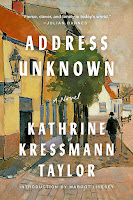Book Review: Address Unknown by Kathrine Kressmann Taylor
 |
My Rating:
⭐️⭐️⭐️⭐️⭐️
Address Unknown by Kathrine Kressmann Taylor is an epistolary novella that features a series of fictional letters between Max Eisenstein, a German-American art dealer of Jewish faith living in San Francisco and his friend and business partner, Martin Schulse who has recently returned to Germany with his family. Together they owned and operated Schulse-Eisenstein Galleries in San Francisco.
The series of eighteen letters (and one cablegram) stretches from 1932 when Martin moves back to Munich and ends in 1934 and follows a timeline in pre-WW2 Europe charting Hitler’s gradual ascent to power and the strengthening of anti-Semitic sentiments resulting in persecution of those belonging to the Jewish faith. Parallel to the changes in the political landscape and ideology in Nazi Germany we see the disintegration of what we can assume was a long-standing friendship. We see, on the one hand, the changes in Martin’s attitude and commitment towards his friendship with Max and his growing devotion to Hitler and Nazism on the other. Max, initially, is hopeful that their friendship would remain unaffected and attempts to remind Martin of the liberal beliefs they shared before Martin’s departure.
“But there is another realm where we can always find something true, the fireside of a friend, where we shed our little conceits and find warmth and understanding, where small selfishnesses are impossible and where wine and books and talk give a different meaning to existence. There we have made something that no falseness can touch. We are at home.”
We witness how Martin emerges from his initial hesitation over Hitler’s agenda(“Yet cautiously to myself I ask, a leader to where? Despair overthrown often turns us in mad directions.”) to a fully indoctrinated and committed Nazi (his reference to Hitler as the “Glorious Leader”).
“I have never hated the individual Jew–yourself I have always cherished as a friend, but you will know that I speak in all honesty when I say I have loved you, not because of your race but in spite of it.”
Martin denounces liberalism as “musty sentimentalizing” and stands firm in his decision to distance himself from Max lest he loses favor with the Nazi party or is viewed as a traitor. (“Do you know what it is to be taken to a concentration camp?”, he writes to Max). His words portray him as a man who is slowly being brainwashed into believing that the oppression and persecution of the Jewish population would result in establishing a “superior” race and securing a great future for Germany. The darkness within him and his loss of humanity is evident in his refusal to help Griselle, Max’s sister with whom he once shared a romantic relationship, when she approaches him for help - an act that ultimately forces Max’s hand.
Written in 1938, this novella was inspired by the changes the author noted in her own German friends who were influenced by Nazism upon returning to Germany. Even though the timeline of this novella pre-dates WW2, it remains just as powerful and relevant to this very day. At approximately sixty-six pages, this is a short but impactful read that will leave a lasting impression. This is an important book, the kind of book that is meant to be read, shared, and never forgotten. In the introduction to this book, Margot Livesey aptly sums up the timelessness of the central theme of this thought-provoking novella.
“How do we know what we know, and when do we know it? Why does a good person become a bad person? What power does a citizen have against the state?”
Comments
Post a Comment